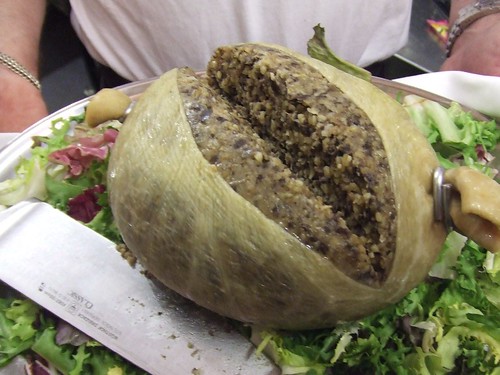Welcome to this week’s Language Blog Roundup, in which we bring you the highlights from our favorite language blogs and the latest in word news and culture.
Earlier this week was Burns Night, and while we celebrated Scottish poet Robert Burns with some Scottish food words, BBC gave us some Scottish food recipes (haggis, anyone?). This week was also the Lunar New Year, which The Atlantic rang in with some gorgeous pictures, while at Language Log, Victor Mair wrote about the year of the dragon.
Mr. Mair also discussed pinyin faux amis and Google translate and Chinese. Mark Liberman explored Finnish language flowers (crash blossoms in English), snowmanteaux, the word quite, and the phrase only and only if. Geoffrey Pullum pointed out an Australian company’s right to use another phrase, nuckin futs, and was puzzled in Tarrgona about elevators and baffled in Barcelona about an airport sign. Mr. Pullum also advised politicians not to borrow from Hollywood (at least not without proper citation) when making speeches.
Mr. Liberman bemoaned the loss of the apostrophe from Waterstones, while Mr. Pullum gave his two cents and wondered if the apostrophe ever represents a sound. Stan Carey considered apostrophe apostasy and rounded up apostrophic reactions from around the web. Mr. Carey also explored new abbreviations, as did Ben Yagoda at Lingua Franca (and don’t forget Erin McKean’s piece on clipped words from October).
Macmillan Dictionary blog offered a great primer on American political discourse, while Johnson pondered mixing languages, losing certain types of British accents, and the word issue. Ben Zimmer discussed American dialects from A to Z, while at Lingua Franca, Geoff Pullum wrote about the singular they and what’s normal and what’s formal; Lucy Ferris commented on comments; and Ben Yagoda read the newspaper with a grammar geek’s eye.
Kory Stamper discussed defining obscenities, and editorial correspondence and the dictionary. Arnold Zwicky considered the word fanny, “an area ripe for trans-Atlantic misunderstanding and offense,” and the geek voice. Sesquiotica examined spoffle (as coined by actor Hugh Laurie); scattermalia, “little details passed back and forth one at a time until you lose track entirely of who said what when in response to what”; and the elusive geoduck (which by the way is not an earth duck).
The Virtual Linguist took a look at masher, “well-to-do young men who came [to the music-hall] mainly to look at the women”; women’s use of vastly and other adverbs; and the dwindling use of barrow boy stock market slang. The Word Spy spotted black-hole resort, “a resort that blocks all incoming and outgoing Internet signals”; workshifting, “using portable devices and wireless technologies to perform work wherever and whenever it is convenient”; and Eurogeddon, “an extreme European economic, political, or military crisis.”
In the week in words, Erin McKean noticed Chollima, a rather frightening North Korean version of Pegasus; neophiliac, those “who chase the new at all costs”; mouse type, “6- or 7-point type” largely used for “warnings, disclaimers and legal jargon”; and weibo, “Twitter-like microblogs” in China (“Because weibo sounds like the Mandarin word for ‘scarf,’ microblogging in China is sometimes referred to as zhi weibo, or ‘knitting a scarf’”).
Erin also collected some new words from noncelebrity neologizers, such as nukepicking, “the combination of nitpicking and blowing things out of proportion”; estiknow, “to assert that you’re 90 percent sure of something”; and technoschmerz, “the emotional pain (schmerz comes from a German word meaning ‘pain’) caused by difficult interactions with electronic gadgets or unhelpful websites.”
Fritinancy’s word of the week was grandiosity, “greatness of scope or intent; feigned or affective grandeur or pomposity; excessive use of verbal ornamentation.” Fritinancy also examined incorrect usage of the word infamous, and the anachronistic usage of the phrase to contact in period drama Downton Abbey. Dialect Blog delved into Downton Abbey’s accents, and the supposed decline of the New York accent. Editor Mark offered an updated archive of very helpful tweeted tips; Lists of Note listed William Safire’s Fumblerules of Grammar; and Mental Floss gave us Ben Franklin’s 200 synonyms for drunk.
We learned that a town in Western France has banned the word mademoiselle, arguing that “women, like men, should not be defined by their marital status”; some teen slang from British TV; the 20 biggest differences between British and American English; the unexpected inspirations behind some children’s books; and the origin of the snark.
We loved this letterheady website and the new look this artist is giving the print dictionary. We were amused by the idea of rabbles at underground Scrabble meetings, and would very much like to read this book, “a historical and cultural study of fiction fandom.”
Finally, we thoroughly enjoyed this Maurice Sendak interview (otherwise known as “Shit Maurice Sendak Says”) with Stephen Colbert. Here’s part two.
That’s it for this week! We hope you Burns Supper suppers enjoyed your haggis, tatties, and neeps, and we wish everyone a lucky and prosperous year of the dragon.

